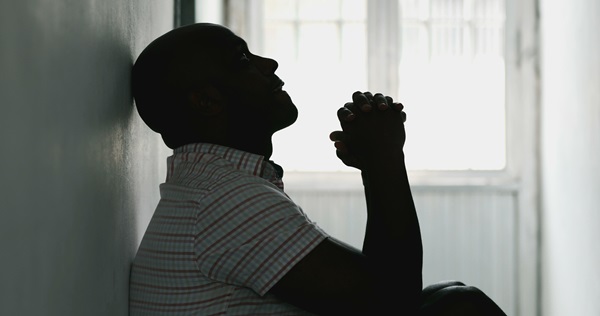Study Reveals Alarming Suicide Rates Among Young Black Men

Young Black men often face systemic racism, socioeconomic disparities, and other challenges that impact their mental health. A recent study from the University of Georgia reveals that one in three rural Black men have experienced thoughts of suicide or death in the past two weeks. The study suggests that early-life adversity and racism are significant factors contributing to these feelings.
Suicide ranks as the second leading cause of death among African Americans aged 15 to 24, according to the Centers for Disease Control and Prevention. The rate at which Black men die by suicide is notably higher than that of Black women, with men dying by suicide over four times as often. This issue appears to be under-discussed and is escalating.
According to Michael Curtis, a co-author of the study and an alumnus of UGA’s Human Development and Family Science Department, there seems to be a lack of focus on identifying which groups are most vulnerable to suicidal thoughts.
“Historically, research has not invested a lot of time and effort in looking into what are the unique cultural contexts that make certain men more at risk for suicidal thoughts than other men,” said Curtis.
How childhood adversity and racial discrimination impact the mental health of young Black men
According to the research, growing up in environments with limited resources and experiencing racial discrimination in early adulthood can hinder the development of healthy, trusting relationships. This lack of trust and caution in social interactions can lead to isolation, which may, in turn, trigger suicidal ideation.
The study tracked over 500 African American men from rural Georgia, from their late teens into their early 20s, over several years. At three different points during the study, these individuals were prompted to recount their childhood experiences and focus on economic struggles and traumatic events. The survey included questions about:
- Physical or emotional abuse
- Witnessing abuse within the family
- Feeling cherished and valued
- Having sufficient food
- Access to medical care during their childhood
Participants in the study were also questioned about their perceptions and emotions regarding close relationships. That includes their trust in romantic partners and concerns about being exploited in relationships. They were asked how often they felt they had been treated unjustly due to their race in the past six months. Additionally, the researchers inquired about symptoms of depression and the frequency of suicidal thoughts or thoughts about death in the last two weeks.
The findings indicated that childhood experiences of trauma, deprivation, and racial discrimination significantly affected the mental health of the participants as they transitioned into adulthood.
Curtis explained, “We found when Black men were exposed to childhood adversity, they may develop an internal understanding of the world as somewhere they are devalued, where they could not trust others, and they could not engage the community in a supportive way.”
What challenges of adversity do young Black men face?
Young Black men, particularly those in rural areas, face greater challenges from childhood adversity. They are more likely to emerge from economically struggling families, live in under-resourced neighborhoods, and encounter trauma within their communities compared to their white counterparts.
Previous studies have documented that racial discrimination heightens the risk of depression, anxiety, and psychological distress among Black individuals across all age groups. While childhood neglect and trauma are predictors of suicidal ideation, the research also highlighted that racial discrimination alone significantly contributes to higher instances of suicidal thoughts.
Steve Kogan, the study’s lead author and a professor at UGA’s College of Family and Consumer Sciences, found that even those who had positive childhood experiences but faced racial discrimination in early adulthood struggled to form and sustain healthy relationships. This isolation often led to increased suicidal thoughts.
“For people who have suicidal thoughts, there’s this sense that no one knows me, nobody cares about me, there’s nobody there for me, I am alone,” said Kogan.
What is the role of healthy relationships in suicide prevention?
Healthy relationships are crucial for mental health and suicide prevention, according to researchers. These connections provide a vital support system for reaching out when overwhelming feelings arise. Parents also have a significant role in aiding their children through these challenges.
“More research is needed, but one finding is unequivocal: Loving yourself as a Black person is foundational,” said Kogan. “Teaching children and youth to be proud of being Black counters the potential for them to internalize negative messages about Blackness that pervade U.S. society.”
This study, conducted by Ava Reck, a doctoral student at UGA’s Human Development and Family Science program, and Assaf Oshri, an associate professor at the College of Family and Consumer Sciences, was published in the journal Cultural Diversity and Ethnic Minority Psychology.
Contact a suicide lawyer who advocates for justice
When families experience the devastating loss of a loved one due to a preventable suicide, they are often left searching for answers and accountability. The Law Offices of Skip Simpson is dedicated to supporting the families of young Black men. We hold accountable medical professionals who could have prevented a suicide but failed to do so.
If your family has suffered such a tragic loss, we encourage you to reach out to us. We offer a free, confidential consultation to discuss your case and explore your legal options. Based in Texas, we provide experienced and compassionate legal services to families across the entire United States. Contact us either by phone or online to learn how we can assist you during this difficult time.




